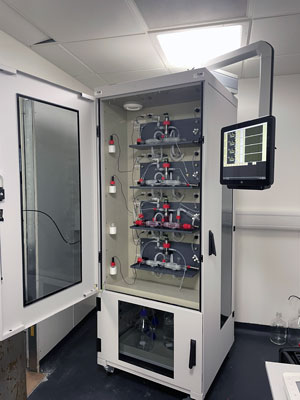Transforming Pharmaceutical Innovation Through Advanced Gut Replication for Smarter Drug Development
GIBio is a facility funded by the UK Engineering and Physical Sciences Research Council.
About GIBio
GIBio addresses a major challenge in understanding the gut's complex dynamic environment by offering a way to replicate it without the limitations of animal or human studies.
This technology facilitates the design, development, and manufacture of ingested products, transforming the process by providing early clinical quality data.

One of a kind
As the only accessible facility of its kind in the UK, GIBio is poised to significantly reduce the time and costs associated with creating new drug products.
Patient-centred products
Oral administration is the primary method for delivering drugs, involving absorption from the gut into the bloodstream via disintegration, dissolution, and transport across the gut wall. These processes are influenced by complex interactions between the gastrointestinal tract, drug, and dosage form, leading to variable delivery performance. Understanding this complexity is limited, but fine-tuning of the equipment to replicate healthy and diseased gut conditions can lead to the development of patient-centred products, ultimately improving therapeutic outcomes.
Our research
Research conducted through GIBio has diverse applications: